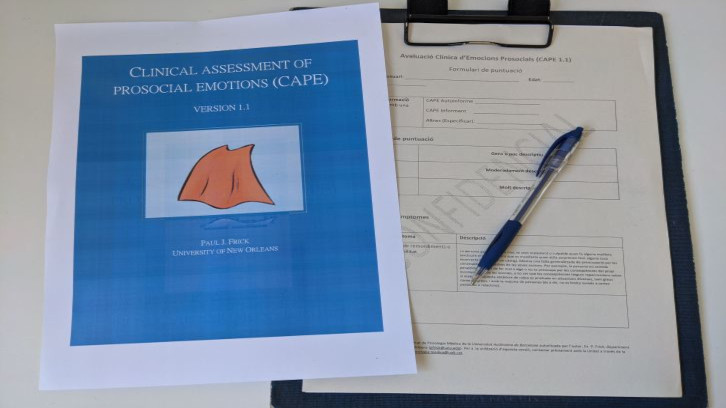Psychometric properties of a new method for the assessment of callous-unemotional traits in child and adolescent population: the Clinical Assessment of Prosocial Emotions: Version 1.1 (CAPE 1.1)

Children and adolescent populations with behavior problems are heterogeneous. The presence of callous-unemotional (CU) traits seems to reveal a subgroup of children at risk of presenting a particularly severe and aggressive trajectory of antisocial behavior. A research group from the Universitat Autònoma de Barcelona (UAB), in collaboration with a group from the Universitat de Lleida (UdL), studied the psychometric characteristics of a new assessment method for the early detection of these traits. This work has been carried out in collaboration with the author of the instrument, Dr. Paul Frick, in two juvenile justice centers in Catalonia.
Aggression, negativism, and impulsivity problems constitute the most prevalent psychopathology in children and adolescents and are among the most frequent reasons for referral to mental health services (hereinafter, PE externalizing problems). Most children and adolescents may present these behaviors at some point. However, in some cases, their frequency, severity, and persistence are symptomatic of more serious problems that can lead to an antisocial and criminal evolutionary trajectory in adulthood.
Studies on the etiology and development of EPs highlight the great heterogeneity of the children who present them and suggest the existence of different developmental trajectories. One of the approaches that has received the most support for detecting subgroups is based on the CU traits (e.g., lack of empathy and guilt, failure to put forth effort in important tasks, shallow and deficient emotions), considered precursors of the affective facet of adult psychopathy. These traits are related to specific cerebral, cognitive, and emotional characteristics and describe a group of children with a particularly severe and aggressive trajectory of antisocial behavior.
The latest version of the Diagnostic and Statistical Manual of Mental Disorders (DSM-5) has included in the diagnostic criteria of Conduct Disorder the specifier "with limited prosocial emotions" (LPE) to describe children and young people with significant levels of CU traits. To qualify for the specifier, two or more of the following criteria must be present: 1) lack of remorse or guilt; 2) callousness-lack of empathy; 3) unconcerned about performance; and 4) shallow or deficient affect. The specifier is expected to identify a more homogeneous subgroup of cases with specific causal factors, which is more likely to show persistent antisocial behavior in adulthood. The latest version of the International Classification of Diseases (ICD-11) also contemplates the possibility of applying the specifier to Oppositional Defiant Disorder. The current challenge is to have assessment tools with good psychometric properties that allow their use in the clinical and forensic fields, among others. One of the leaders in the study of CU traits, Dr. Paul Frick, is developing an assessment method, the Clinical Assessment of Prosocial Emotions: Version 1.1 (CAPE 1.1), which will allow qualifying the EPL specifier from a multi-informant perspective and with multiple sources of information.
A study* carried out under the direction of Beatriz Molinuevo (Department of Psychiatry and Forensic Medicine, Institut de Neurociències, UAB), member of the Human Laboratory research group, in collaboration with Iolanda Batalla and Vanessa Pera-Guardiola (Biomedical Research Institute of Lleida, UdL) and Paul Frick (Louisiana State University, Learning Science Institute of Australia), has analyzed the psychometric properties of CAPE 1.1 in a sample of 72 young males who were incarcerated in two Spanish juvenile detention centers of the Department of Justice of Catalonia (age range = 14-22 years). The CAPE 1.1 showed good interrater agreement for making the diagnosis of the LPE specifier (presence/absence) and good internal consistency reliability. Also showed significant associations with other measures of CU traits, but less consistency in the associations with other dimensions of the psychopathy construct (narcissism/impulsivity). Youth who met the diagnostic criteria for the specifier scored higher on externalizing problems (rule-breaking and aggressive behavior) compared to those who did not meet the diagnostic criteria. No differences were found between the two groups in internalizing problems (symptoms of anxiety and/or depression).
These results provide a first step in the process of developing a relatively new assessment tool for the diagnosis of CU traits in children and adolescents of potential utility in clinical and forensic settings in culturally diverse samples.
*This research was financially supported by the Centre d’Estudis Jurídics i Formació Especialitzada, Government of Catalonia (DOGC Núm. 7024-23.12.05; DOGC DOGC Núm. 7274 – 27/12/16), by the Departament d’Economia i Coneixement, Government of Catalonia (2014SGR-1587), and by the Ministerio de Economía, Industria y Competitividad, Spanish Government (PSI2015-67441-R).
Beatriz Molinuevo1, Vanessa Pera-Guardiola2, Albert Bonillo1, Iolanda Batalla2, Rafael Torrubia1, Paul J. Frick3
1Universitat Autònoma de Barcelona
Beatriz.Molinuevo@uab.cat; Rafael.Torrubia@uab.cat; Albert.Bonillo@uab.cat
2Universitat de Lleida
vanessa.pera@sjd-lleida.org; ibatalla@gss.cat
3Louisiana State University
Learning Science Institute of Australia
pfrick@lsu.edu
References
Molinuevo, B., Martínez-Membrives, E., Pera-Guardiola, V., Requena, A., Torrent, N., Bonillo, A., Batalla, I., Torrubia, R., & Frick, P. J. (2020). Psychometric Properties of the Clinical Assessment of Prosocial Emotions: Version 1.1 (CAPE 1.1) in Young Males Who Were Incarcerated. Criminal Justice and Behavior, 47(5), 547–563. https://doi.org/10.1177/0093854819892931
Molinuevo, B., Requena, A., Torrubia, R., Batalla, I., Martínez-Membrives, E., Pera-Guardiola, V., Torrent, N., Bonillo, A., Tello, C., & Fortés, M. (2017). Utilitats clínica i forense de l’especificador “amb emocions prosocials limitades” del Trastorn de Conducta del DSM-5 en joves internats en centres educatius. Centre d’Estudis Jurídics i Formació Especialitzada (CEJFE). http://cejfe.gencat.cat/web/.content/home/recerca/cataleg/crono/2017/emocionsProsocialsLimitades.pdf

